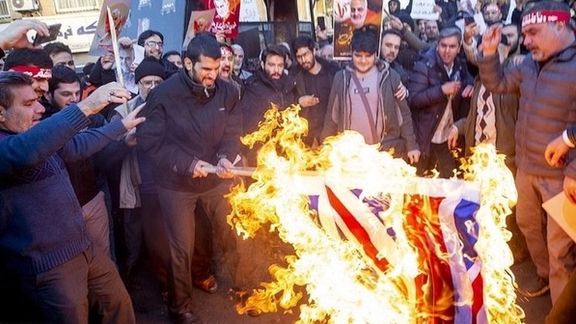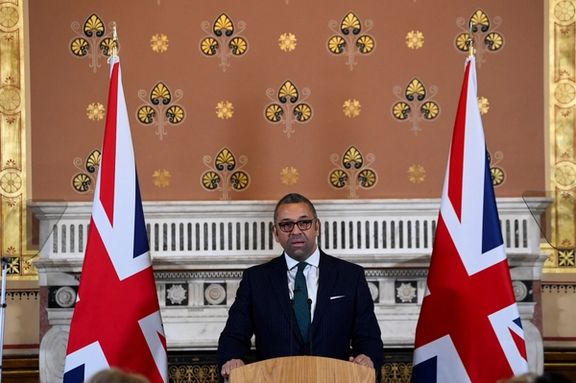UK Politicians Call For Tougher Stance Against Iran

A group of UK politicians have written to Foreign Secretary James Cleverly calling on the government to adopt more stringent measures against Iran.

A group of UK politicians have written to Foreign Secretary James Cleverly calling on the government to adopt more stringent measures against Iran.
“Iran is the Middle East’s largest, most aggressive power, with an obvious commitment to revising the global order, with a growing alliance with Russia and a desire to deepen it," read the letter by a group of prominent British figures, including two former defense ministers, a former leader of the Liberal Democrat party, and the current chair of the parliamentary committee on foreign affairs.
The signatories included Menzies Campbell, former leader of the Liberal Democrats, Michael Fallon, former defense secretary, Alicia Kearns, chairwoman of the Commons Foreign Affairs Select Committee, General David Richards, former chief of defense staff, George Robertson, former NATO secretary general, and Mark Sedwill, former national security adviser and former cabinet secretary.
The letter highlighted Iran’s increasing audacity in its pursuit of international disruption and condemns its human rights record, nuclear program acceleration, support for proxies in the Middle East, assistance to Russia in the Ukraine conflict, and sponsorship of terrorism and kidnapping, stating that these actions contribute to Iran’s status as a clear threat to international stability and necessitate a robust response from the UK and its allies.

In the letter, they backed the analysis and recommendations of a report from the British conservative think tank Policy Exchange, which argues that treating Iran’s nuclear ambitions in isolation from broader security concerns is a failure of Western policy, urging a comprehensive approach to deal with the regime.
"The most obvious failure of western policy, and particularly British and European policy, has been to compartmentalize the nuclear issue diplomatically and then treat this as the central policy issue in relations with Iran,” read the report.
Stressing the need to view the nuclear program within the context of Iran’s wider aspirations and aggressive behavior, the think tank said, "Nuclear developments, while an important part of the package, must be situated within a more comprehensive understanding of the wider threat posed by Iran. Iran policy, meanwhile, must begin with the strategic threat that Iran poses, not the single, symptomatic element that is its nuclear program.”
The report also claimed that in the 2010s, the Islamic Republic shifted from a defensive strategic posture to an expansionist one, warning that “Iranian expansion across the Middle East will continue unless there is a Western – and indeed a regional Arab – policy change.”
Referring to the regime’s links to proxies in Iraq, Syria, Lebanon, and Yemen, as well as relationships with Palestinian Islamic Jihad (PIJ) and Hamas, the report argued: “The longer Iranian regional expansion is left unchecked, the more Iran will cement its hegemony over significant parts of the Levant, Iraq and the southern Arabian Peninsula, intensify its efforts to undermine and eventually destroy Israel and expand its presence beyond the Middle East.”
Moreover, the report argues that the UK government should be doing more to counter both overt and covert regime’s operations within Britain, to "prevent assassinations and kidnappings in the UK, including by tasking the Joint Terrorism Analysis Center and National Crime Agency’s intelligence capabilities, along with MI5 and MI6 to hire more Persian analysts and better fuse MI5, MI6, and NCA capabilities".
Rooting for tougher sanctions on Iran and a crackdown on its illicit finances as well as disrupting the regime’s relations with Russia, the report called for the UK government to trigger the snapback process of the Joint Comprehensive Plan of Action (JCPOA), also known as the 2015 Iran nuclear deal, to isolate the regime and gain international support for an anti-Iranian coalition.
“Iran will soon expand its support to Russia’s war in Ukraine. Having already transferred drones to Russia, Iran is likely soon to begin transfers of advanced ballistic missiles to the Kremlin,” the report underlined, forewarning of the sanctions on Iran’s ballistic missile exports that will lapse in October under the JCPOA, if the snapback is not applied.

The think tank argued that triggering the snapback mechanism forces the issue of Iran among the signatories of the JCPOA and send a clear message about the international community’s stance on the regime’s nuclear program
Strengthening security and intelligence partnerships with key powers surrounding Iran, including Azerbaijan, Saudi Arabia, the UAE, Jordan, and Israel, was also suggested as a means to enhance the UK’s position in dealing with the Islamic Republic.
According to a report by The Times, UK diplomats are in talks with western allies -- France, Germany and the United States -- about reimposing sanctions on Iran amid warnings that the country is a threat to British interests “at home and abroad”.
This year, British police and the security services said they had foiled 15 plots by Iran to either kidnap or kill British or UK-based individuals it considers “enemies of the regime”.